

How to respond to 'Do you have any questions for me?' during the interview. The interview is drawing to a close and you’re feeling confident when the interviewer asks, “Do you have any questions for me?”

While you might feel those butterflies rush back, you should probably find a way to answer instead of just saying no. We had a conversation with Jamie Spiva, CFRE, a Director of Development and Executive Director for non-profits who had her fair share of being asked that question. Prof Prac - Communication.
6 reasons why you're a bad listener (and how to change it) Design. Prof Prac - IP. ProfPrac - Critical Thinking. Prof Prac - Kaupapa. 1 Irresistible Pitch Tip That Worked for Steve Jobs and the Google Founders. "Perspective". Online Information Tools. Raindrop: a beautiful all-in-one bookmark manager – ReviewMonster. There’re just too many stuffs out there.
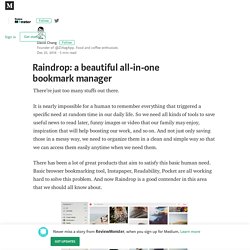
It is nearly impossible for a human to remember everything that triggered a specific need at random time in our daily life. So we need all kinds of tools to save useful news to read later, funny images or video that our family may enjoy, inspiration that will help boosting our work, and so on. And not just only saving those in a messy way, we need to organize them in a clean and simple way so that we can access them easily anytime when we need them. There has been a lot of great products that aim to satisfy this basic human need. Basic browser bookmarking tool, Instapaper, Readability, Pocket are all working hard to solve this problem. Raindrop is a beautiful all-in-one bookmark manager that integrates auto-tagging, fast search, preview capture, drag and drop features.
It is offered in both free and pro version. Nested directoriesSuggested tags1GB of new uploads each monthDropbox backupPriority support Customization Collection Suggestion.
Prof Prac - Presentation. Brand Storytelling Beyond The Hero's Journey. In the age of disruption, nothing is safe from profound change.
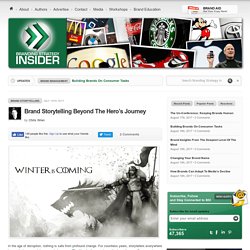
For countless years, storytellers everywhere have relied on a model commonly known as The Hero’s Journey to captivate audiences. From great literature, to epic films all the way to a :30 commercial (or even world-class Ted Talk), the basic formula wherein a hero is called to an adventure, embarks on a quest riddled with conflict, discovery and enlightenment, and returns home having solved the problem, succeeds because it appeals to our sense of what’s right and what’s wrong, and fulfills the expectation of a conflict needing to be resolved.
This traditional, linear method is being disrupted by a world that is anything but linear or predictable. Jeff Gomez at Starlight Runner has done an enormous amount of research in this area, and has put together a new model he calls The Collective Journey. Our ability to express ourselves and access the perspectives of others is changing our appetite for story.
Khanacademy. Why VR “Storytelling” does not currently work. And can it ever work? Why VR “Storytelling” does not currently work.
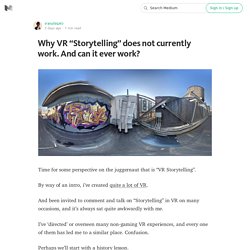
And can it ever work? Time for some perspective on the juggernaut that is “VR Storytelling”. By way of an intro, i’ve created quite a lot of VR. And been invited to comment and talk on “Storytelling” in VR on many occasions, and it’s always sat quite awkwardly with me. I’ve ‘directed’ or overseen many non-gaming VR experiences, and every one of them has led me to a similar place.
Perhaps we’ll start with a history lesson. I’m old enough to remember the advent of Flash Video on the internet. And what happened? Well. Of course, Virtual Reality is very different to the Internet, but not in one profound way. And this brings us to the elephant in the room with the current notion of VR Storytelling. But herein lies the VR Storytelling anachronism. The hardware has raced forward at an incredible speed. Hardware mimics real life, and real life timing. These things do not co-exist. 27 Apps Designers Can't Live Without. Maybe it's just Gmail, or maybe it's something more esoteric like Processing, but there are certain apps we rely on so much that if they suddenly went missing, we'd have a hard time getting by.
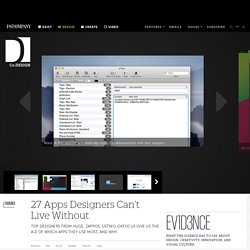
That's especially true for designers. Their livelihoods depend upon great software. The Most Important Design Jobs Of The Future. Yesterday's graphic designers are today's UX designers.
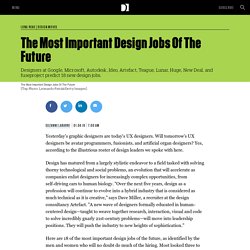
Will tomorrow's UX designers be avatar programmers, fusionists, and artificial organ designers? Yes, according to the illustrious roster of design leaders we spoke with here. Design has matured from a largely stylistic endeavor to a field tasked with solving thorny technological and social problems, an evolution that will accelerate as companies enlist designers for increasingly complex opportunities, from self-driving cars to human biology. "Over the next five years, design as a profession will continue to evolve into a hybrid industry that is considered as much technical as it is creative," says Dave Miller, a recruiter at the design consultancy Artefact.
"A new wave of designers formally educated in human-centered design—taught to weave together research, interaction, visual and code to solve incredibly gnarly 21st-century problems—will move into leadership positions. The next "big thing" is not a thing.